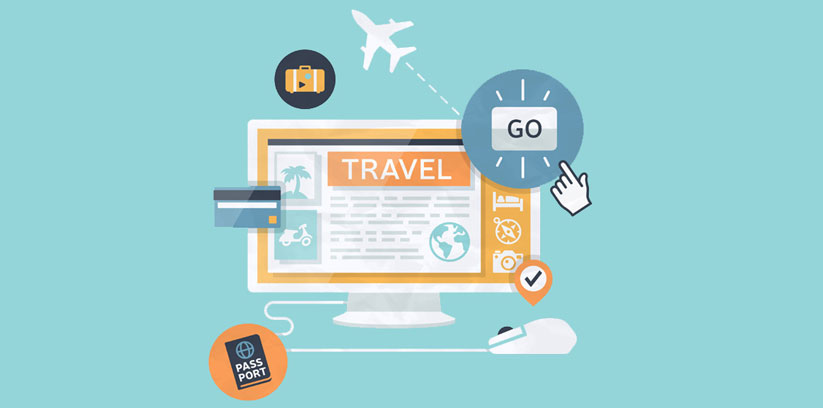What is travel company? A travel company is a business that helps individuals and groups plan, organize, and book trips, vacations, or business travel.
These companies act as experts in the travel industry, offering services such as flight reservations, hotel bookings, car rentals, travel insurance, tour packages, and more. The main goal of a travel company is to make travel easier, more enjoyable, and often more affordable for its clients.
There are different types of travel companies. Some operate as traditional travel agencies, where clients speak directly with an agent who arranges their entire trip.
Others function as online travel agencies (OTAs) like Expedia or Booking.com, offering digital platforms where users can compare prices, read reviews, and book services instantly. Some travel companies also specialize in niche markets, such as luxury travel, adventure tours, honeymoons, cruises, or corporate travel.
What makes a travel company valuable is its ability to save time and reduce stress for travelers. These companies often have access to exclusive deals, insider knowledge, and connections with hotels, airlines, and tour operators.
They can also assist with visa requirements, travel insurance, itinerary planning, and provide support during emergencies while you’re traveling.
Additionally, many travel companies now offer custom travel experiences, tailoring each trip to match the traveler’s interests, schedule, and budget. Whether you’re booking a simple flight or planning a multi-country vacation, a travel company can help make the process smooth and reliable.
In short, a travel company is a one-stop solution for planning your journey. It brings convenience, expertise, and peace of mind—especially helpful when navigating unfamiliar destinations or complex travel arrangements.
What Is a Travel Company?
A travel company is a business that specializes in helping people plan, book, and manage their travel experiences. Whether it’s a weekend getaway, a honeymoon, a group tour, or a complex international itinerary, travel companies offer the tools and expertise to make trips smoother, more enjoyable, and often more cost-effective.
These companies serve as intermediaries between travelers and service providers such as airlines, hotels, car rental agencies, cruise lines, and tour operators.
There are two main types of travel companies: traditional travel agencies and online travel agencies (OTAs). Traditional agencies provide in-person service and personalized guidance, often ideal for custom trips or travelers who prefer human support.
Online travel agencies, like Expedia, Booking.com, and Trip.com, allow users to research and book their travel entirely online, providing convenience and often competitive prices.
Some travel companies also act as tour operators, designing and selling pre-arranged travel packages that include transportation, accommodations, and guided activities.
These packages are popular with travelers who want a well-organized experience without the hassle of planning every detail themselves.
Travel companies offer a wide range of services, including booking flights and hotels, securing visas and travel insurance, providing local recommendations, and offering 24/7 support during trips. They can also handle special arrangements like cruises, safaris, destination weddings, or business travel coordination.
In short, a travel company simplifies the entire travel process. By combining industry knowledge, access to deals, and personalized service, these companies help travelers save time, avoid stress, and enjoy memorable experiences.
Whether you’re a first-time tourist or a frequent flyer, a reliable travel company can be a valuable partner in making your journey successful.
Types of Travel Companies

Travel companies come in various types, each serving different needs and styles of travel. Understanding the main categories can help you choose the right one for your next trip.
The most common type is the travel agency, which can be either traditional or online. Traditional travel agencies operate out of physical offices, where travel agents provide personalized service, help clients plan their trips, and handle bookings.
These are ideal for travelers who want expert guidance or are booking complex itineraries like honeymoons, cruises, or group tours.
In contrast, online travel agencies (OTAs)—like Expedia, Booking.com, and TripAdvisor—allow users to compare prices and book flights, hotels, and car rentals directly through digital platforms. OTAs are popular for their convenience and often lower prices.
Another major category is the tour operator. Tour operators create and sell pre-packaged travel experiences, which may include transportation, accommodations, meals, and guided tours.
These companies are ideal for travelers who want an all-in-one, hassle-free vacation. Examples include companies like G Adventures, Trafalgar, and Intrepid Travel.
Destination management companies (DMCs) specialize in handling travel logistics within a specific location or country. They provide on-the-ground support, local expertise, and customized experiences for inbound tourists. Travel companies in this category are often used by tour operators and event planners.
There are also corporate travel companies that focus on managing business travel for organizations. They handle everything from booking flights and hotels to tracking travel expenses and ensuring employee safety.
Lastly, niche travel companies focus on specific interests such as eco-tourism, luxury travel, adventure tours, or medical tourism. These companies cater to travelers with specialized needs or preferences.
What Services Do Travel Companies Offer?
Travel companies provide a wide range of services designed to simplify and enhance every step of a traveler’s journey. Whether you’re planning a family vacation, a business trip, or a luxury escape, these companies act as expert coordinators, offering both convenience and peace of mind.
One of the core services is travel booking. This includes arranging flights, hotels, rental cars, and train tickets. Many travel companies can access exclusive rates and bundle deals that aren’t available to the public.
They also help with cruise bookings, vacation packages, and multi-destination itineraries, saving travelers hours of research and comparison.
In addition to booking logistics, travel companies often provide custom itinerary planning. This service involves creating personalized travel experiences based on the traveler’s budget, interests, and time frame.
From choosing the best places to visit to suggesting off-the-beaten-path activities, travel consultants tailor each trip to fit the client’s needs.
Travel companies also offer visa assistance and help with travel insurance, ensuring that travelers meet entry requirements and are protected from unexpected issues like trip cancellations or medical emergencies.
For travelers looking for guided experiences, many companies organize tours and excursions, either private or in groups. These can include cultural activities, outdoor adventures, culinary experiences, or historical site visits, often led by local experts.
Additionally, most travel companies provide customer support before, during, and after the trip. This includes emergency assistance, changes in plans, or handling disruptions like flight delays or cancellations.
Overall, travel companies aim to make trips stress-free and more enjoyable by handling the details—so travelers can focus on the experience rather than the logistics.
Benefits of Using a Travel Company
Using a travel company offers many benefits that can transform a good trip into a great one. Whether you’re planning a quick getaway or a complex international adventure, working with a travel company saves time, reduces stress, and often provides access to better deals and expert advice.
One of the biggest advantages is convenience. Travel companies handle all the research, bookings, and logistics—flights, hotels, transportation, tours, and insurance—so you don’t have to. They can also manage last-minute changes, rescheduling, or cancellations, saving you time and hassle when plans shift unexpectedly.
Another major benefit is expertise. Travel professionals know the best destinations, hidden gems, ideal times to travel, and common pitfalls to avoid. They often have first-hand experience with hotels, activities, and local providers. This insight allows them to create personalized itineraries based on your preferences, budget, and travel goals.
Many travel companies also offer exclusive deals and perks through partnerships with airlines, resorts, and tour operators. These may include free room upgrades, airport transfers, spa credits, or early check-in—extras you might not get when booking on your own.
For more complex trips—such as honeymoons, safaris, multi-country tours, or business travel—travel companies ensure everything runs smoothly by coordinating schedules and managing the small details that make a big difference.
Additionally, having 24/7 support during your trip adds peace of mind. If something goes wrong (flight delays, lost luggage, or unexpected closures), you have a professional to call who can step in and solve the problem quickly.
In summary, a travel company brings value far beyond just booking your trip. It offers convenience, expert planning, special access, and reliable support, making your travel experience smoother, safer, and more enjoyable from start to finish.
Do You Need a Travel Company for Your Trip?

Whether or not you need a travel company for your trip depends on your destination, budget, travel experience, and personal preferences.
For some travelers, planning a simple weekend getaway or booking a direct flight and hotel online may be easy and cost-effective. However, for more complex or high-stakes trips, a travel company can offer significant advantages.
If you’re traveling internationally, especially to unfamiliar destinations, using a travel company can reduce stress and ensure you don’t miss critical details—like visa requirements, health regulations, or local customs. Travel agents are trained to handle these logistics and can help avoid costly mistakes.
Travel companies are also extremely helpful for multi-stop vacations, group trips, destination weddings, honeymoons, or business travel—situations where coordination, timing, and customization are key.
In these cases, having a professional manage the arrangements ensures everything runs smoothly and stays within your budget.
Even if you’re a frequent traveler, you might appreciate the time savings and exclusive perks a travel company can provide, such as room upgrades, flexible booking policies, or curated local experiences.
On the other hand, if you enjoy planning your own itineraries, comparing prices, and being in full control of your bookings, you may not need a travel company. Online booking platforms and travel apps have made self-planning more accessible than ever.
In short, you don’t always need a travel company—but in the right circumstances, it can be an invaluable resource. If you want convenience, expert advice, or help managing a detailed or high-investment trip, using a travel company may be the smartest choice.
Final Thoughts
In today’s travel landscape, planning a trip can be as simple as a few clicks—or as complex as coordinating multiple flights, hotels, activities, and documents across different countries. That’s where travel companies come in.
Whether you’re a first-time traveler or a seasoned globe-trotter, working with a reliable travel company can elevate your experience from average to exceptional.
Throughout this guide, we’ve explored what a travel company is, the types that exist, and the valuable services they offer—from booking and itinerary planning to expert support and special perks. We’ve also looked at when it’s worth using one, especially for complex journeys or those requiring insider knowledge and 24/7 assistance.
The key takeaway? Travel companies save you time, reduce stress, and provide expertise that’s hard to match on your own. While tech-savvy travelers may enjoy the control and independence of booking solo, others will find confidence and comfort in having professionals handle the details—especially for international trips, group tours, or milestone vacations like honeymoons.
Ultimately, deciding whether to use a travel company depends on your personal needs, budget, and the complexity of your trip. But knowing that expert help is available, especially when unexpected issues arise, can make a world of difference in how you experience your travels.

